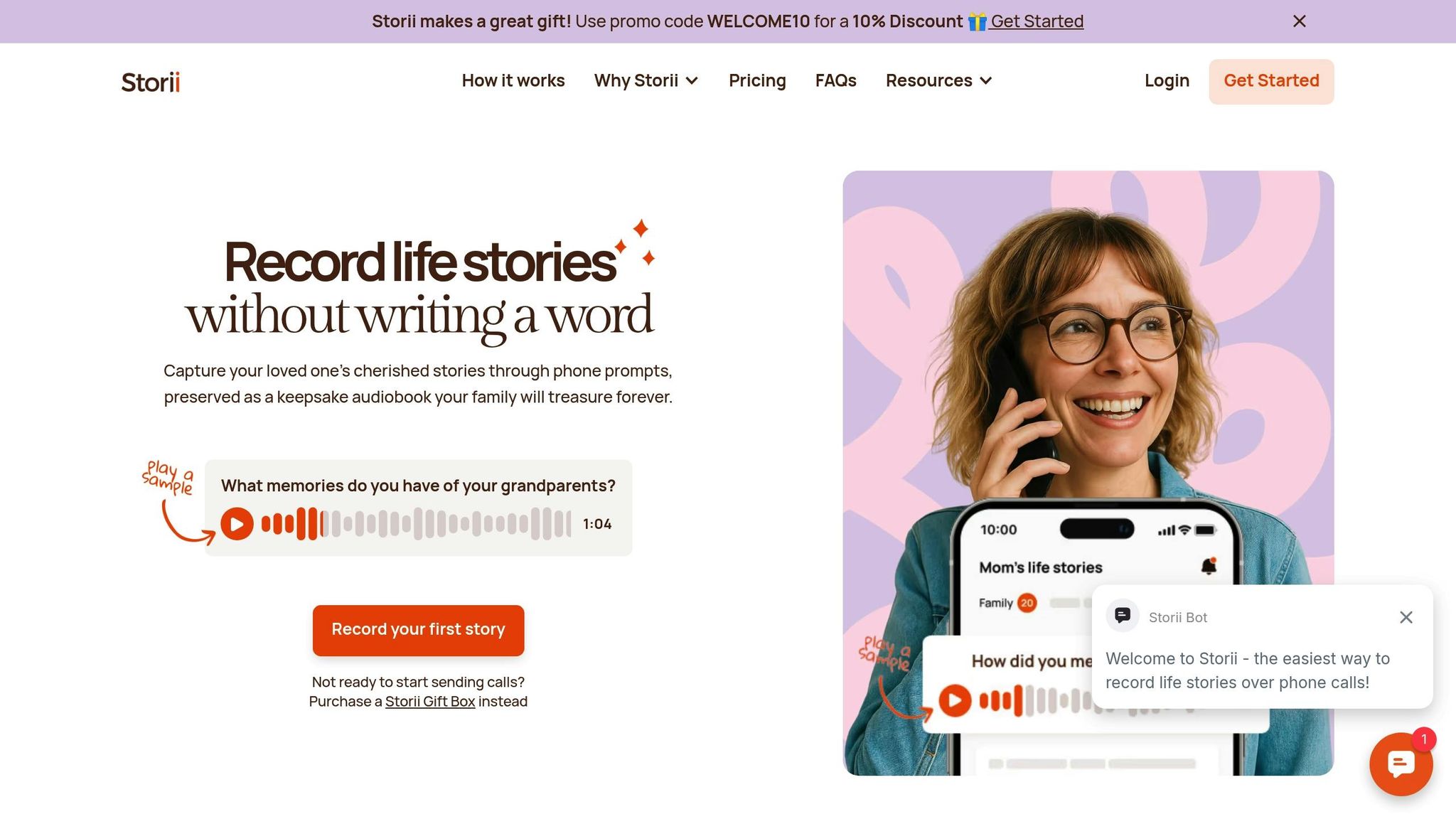通話の録音 米国では、連邦法と州法の両方を理解し、遵守する必要があります。知っておくべきことは次のとおりです。
- 連邦法: ザ・ 電子通信プライバシー法 少なくとも 1 人の参加者が同意すれば録音を許可します。
- 州法: すべての参加者の同意を必要とする州もあれば、連邦の一党同意規則に従う州もあります。例えば:
- 一党同意国: テキサス、ニューヨーク、ジョージア
- 全当事者同意状態:カリフォルニア、フロリダ、イリノイ。
- 州間通話: 通話に複数の州の参加者が参加する場合は、より厳しい法律が適用されます。
- 同意方法: 口頭、書面、または黙示的な同意(ビジネスコールに関する自動免責事項など)を取得します。
- リーガルリスク: これらの法律に違反すると、罰金、訴訟、または刑事責任を問われる可能性があります。
コンプライアンスを維持するには:
- 関係するすべての州の法律を定めてください。
- 参加者に通知し、同意を文書化します。
- 録画には安全なストレージを使用し、アクセスを制限してください。
次のようなツール ストーリイ 同意を自動化し、記録を安全に保存することで、プロセスを簡素化します。特に、家族の話の保存などの個人的な使用に適しています。
クイックヒント: 常に注意を怠らないようにしてください。同意について確信が持てない場合は、記録しないでください。
通話録音法 (地方、州、連邦) | Rev
通話録音に関する連邦および州の同意法
米国では、通話録音に関する法律は、連邦規制と個々の州の規則という2つのレベルで運用されています。通話を合法的に録音するには、これらの法律を理解することが重要です。通常、どのような状況にも最も厳しい規則が適用されます。
連邦法:一党同意規則
1986年の電子通信プライバシー法(ECPA)に基づく連邦法では、会話に関与した少なくとも一方の当事者の同意がある限り、通話の録音が許可されています。つまり、通話に参加している場合でも、同意するだけで合法的に録音できます。ただし、自分が参加していない会話を、当事者の同意なしに録音することは連邦盗聴法に違反し、刑事責任を問われる可能性があります。
一党同意ルールはすべての州のベースラインとなっていますが、多くの州ではそれを優先するより厳しい要件を設けています。
州法:一党同意 vs 全当事者同意
連邦法では一方の同意が認められていますが、一部の州では、録音前にすべての参加者の同意を求めています。テキサス州、ニューヨーク州、ジョージア州、オハイオ州などの州では、一当事者同意の規則に従っています。一方、カリフォルニア州、フロリダ州、イリノイ州などの州では、全当事者同意法が施行されています。これらの州では、たとえあなたが通話に参加していても、関係者全員に通知せずに録音すると、刑事罰または民事罰が科せられる可能性があります。
州間通話はさらに複雑になります。参加者が異なる州にいて、法律が相反する場合は、通常、より厳しい規則が適用されます。たとえば、一方の同意状態にあるが、全員の同意状態にある人に電話をかける場合は、全員同意の要件に従う必要があります。
特別なケースと例外
特定のシナリオでは、さらに課題が生じます。たとえば、多くの企業では、「この通話は品質保証の目的で録音されている可能性があります」などの自動メッセージを使用しています。これらのアナウンスは暗黙の同意として扱われます。発信者が会話を続ければ、録音に事実上同意したことになります。
カスタマーサービス部門はこうした免責事項に依拠することがよくありますが、企業は事業を展開しているすべての州や顧客にサービスを提供しているすべての州で法律の遵守を確認する必要があります。911への電話などの緊急通報は、公共の安全上の理由から、通常、同意を必要とせずに自動的に録音されます。同様に、政府機関への電話にも異なる規則が適用される場合があります。
通話録音法に違反すると、特に当事者全員の同意が得られた状態では、罰金、懲役、民事訴訟などの重大な結果を招く可能性があります。海外の参加者が参加する国境を越えた通話は、外国の法律により厳しい要件が課される場合があるため、さらに複雑になります。
この法的基盤は、次のセクションの基礎となります。次のセクションでは、これらの法律に従って通話を録音する方法を探ります。
通話を合法的に録音する方法
通話の録音には法的責任が伴います。法律の範囲内にとどまり、潜在的な問題から身を守るためには、連邦および州の規制に注意深く従う必要があります。
どの同意法が適用されるかを調べる
録音を始める前に、自分の状況に適用される同意法を知っておくことが不可欠です。米国では、 38の州とコロンビア特別区では一方の同意が必要、一方 11の州が全当事者の同意を義務付けています 会話を録音するため。この違いは進め方に大きく影響します。
まず、すべての参加者がどこにいるかを特定することから始めます。全員が同じ州にいる場合は、信頼できる法的リソースを使用してその州の法律を確認してください。州の境界を越える通話については、注意して進めてください。によると ジャスティア:
「電話が州の境界を越えて行われる場合、責任のリスクを回避するために、最も制限の厳しい法律を遵守したいと思うかもしれません。」
たとえば、テキサス州(一党同意州)にいて、カリフォルニア州の誰かに電話をかける(全当事者同意州)場合は、カリフォルニア州のより厳しい規則に従い、参加者全員から許可を得る必要があります。
正確性を確保するには、法的データベースを参照するか、弁護士に相談してください。マティーセン・ウィッカート&レーラーは次のように説明しています。
「経験則としては、記録装置が設置されている管轄区域の法律が適用されるということです。」
適用法を確認したら、必要な権限の確保に進むことができます。
同意の取得と文書化
法律を理解することは最初の一歩に過ぎません。次に、同意を得る必要があります。一方の当事者による同意を得た状態では、通常、法的要件を満たすには電話会議への参加だけで十分です。ただし、相手に明示的に通知し、同意を得ることにより、保護が強化され、信頼が高まります。当事者全員の同意が得られた状態では、記録を開始する前に、関係者全員に通知し、同意を得ることが法的に義務付けられています。
同意を文書化することは重要です。これにはいくつかの方法があります。
- 口頭での同意: 通話中に、「この会話を録音して記録に残したい」などと言ってください。みんなでいいの?」各人が確認するまで待ってから、次に進んでください。
- 書面による同意: 重要な電話やビジネス関連の電話の場合は、録音の意図を説明したメールを事前に送信し、書面による確認を依頼してください。これにより、明確で文書化された証跡が作成されます。
- 自動通知: 企業では、「この通話は品質保証の目的で録音されている可能性があります」などの自動メッセージを頻繁に使用します。これを聞いた後も参加者が通話を続けた場合、一般的には暗黙の同意とみなされます。
どちらの方法にも利点がありますが、書面または記録による口頭による同意が最も強力な法的保護を提供します。
すべての関係者に通知し、記録を残す
透明性を保ち、詳細な記録を維持することは、コンプライアンスを維持するための鍵です。一方の同意状態であっても、関係者全員に通知することで、誤解や紛争を避けることができます。
各通話の開始時に、録音する意図を明確に伝えてください。たとえば、「念のため、この会話を記録しておきます」としましょう。このようなオープンな姿勢は、信頼を築くだけでなく、法的な問題が生じる可能性を減らすことにもなります。
各通話の詳細なログを保管し、日付、時刻、参加者、同意の取得方法を記録してください。ビジネスコールの場合、このレベルの記録管理は、後で疑問が生じた場合に非常に役立ちます。
同意記録は、記録そのものとは別に、安全なスプレッドシートやデータベースなどに保存します。これにより、必要に応じてコンプライアンスを証明しやすくなります。このプロセスを支援する最新のツールの多くは、記録開始前に同意を得るよう促す自動プロンプトなどの機能を備えています。これらのステップにより、業務に役立つ明確で検証可能な文書が確実に得られます。
コンプライアンスとプライバシーのベストプラクティス
プライバシーを保護し、コンプライアンスを確保するための賢明な対策を講じることは不可欠です。これらの対策は、セキュリティをさらに強化するだけでなく、倫理的な記録慣行への明確な取り組みを示すものでもあります。
免責事項メッセージまたはビープ音を使用する
自動免責事項メッセージは、法的問題を回避するためのシンプルで効果的な方法です。これらのメッセージは通話の開始時に再生され、会話が録音されていることをすべての参加者に通知します。一般的なメッセージには、録音は品質保証、トレーニング、コンプライアンスなどの目的であり、通話を続けると録音に同意したと記載されている場合があります。
自動メッセージを使用すると、手動で同意を促す必要がなくなり、コンプライアンスが一貫して処理されます。
もう1つのオプションは、通話が録音されていることを継続的に通知する役割を果たす定期的なビープ音です。これらのトーンは 15 ~ 30 秒ごとに再生されるように設定されていることが多く、ほとんどの州では法的に義務付けられていませんが、透明性を高めることはできます。多くの録音システムでは、これらのトーンの周波数と音量を調整して、邪魔にならずに目立つようにすることができます。特に、最初の同意が記憶から消えてしまうような長時間の会話に役立ちます。
明確な通知を設定したら、次のステップはそれらの記録を安全に保つことに集中することです。
記録を安全に保管して保護する
適切な通知を確認したら、録音を保護することが次の優先事項です。暗号化またはパスワードで保護されたストレージシステムを使用し、安全な場所への自動バックアップを設定してください。多くの場合、セキュリティ対策が強化されたクラウドストレージプラットフォームは、ローカルコンピュータにファイルを保存するよりも信頼性の高い保護を提供します。
録音をタイプ別に整理することも役立ちます。たとえば、ビジネス通話では、個人の録音とは異なる保存期間やアクセス制限が必要になる場合があります。これらを分離しておくと、特定の法的要件や運用上の要件に従って管理しやすくなります。
レコーディングへのアクセスは、必要な人に限定してください。小規模な組織でも、すべてのチームメンバーがすべてのファイルにアクセスする必要があるわけではありません。職務に基づいてユーザー権限を割り当てることで、プライバシーリスクを軽減し、機密性を維持できます。
また、バックアップシステムを定期的にテストして、必要に応じて記録を復元できることを確認することも重要です。
保存ポリシーは、コンプライアンスとプライバシーのバランスを取る上で重要な役割を果たします。記録をどのくらいの期間保存するかについて、明確なタイムラインを定義してください。たとえば、ビジネス関連の通話は数年間保存する必要がある一方で、個人的な録音は短期間の保存しか必要ない場合があります。録音の保存期間が終了したら、削除することでプライバシーリスクを最小限に抑えることができます。
強力なパスワード、二要素認証、最新のソフトウェアなどの技術的保護手段を、スタッフトレーニングや機密保持プロトコルなどの管理手段と組み合わせてください。録音や保管に使用されるデバイスの物理的なセキュリティを見逃さないでください。ラップトップや電話などの機器は、使用しないときは安全に保管し、録音ツールへのアクセスは許可された個人のみに制限する必要があります。
sbb-itb-ce27da
リーガルコールレコーディング技術
テクノロジーの進歩により、コンプライアンスおよびセキュリティプロセスが自動化され、リーガルコールの録音がはるかに簡単になりました。最新のプラットフォームは複雑な法的要件を処理するように設計されているため、ユーザーの負担を軽減すると同時に、すべてのアクションが法的範囲内にとどまるようになっています。
今日のプロフェッショナルレコーディングソリューションには、自動レコーディング通知、暗号化されたストレージ、カスタマイズ可能な保存ポリシーなどの機能が搭載されています。これらのツールは法的保護手段をシステムに直接統合し、自動化された同意プロンプト、詳細なユーザー権限、コンプライアンス監視などを行います。このようなイノベーションは、次のようなプラットフォームに強固な基盤を提供します。 ストーリイ、次のことに焦点を当てています 個人履歴の保存。
どうやって ストーリイ リーガルコールの録音に役立ちます

これらの技術的進歩を踏まえて、 ストーリイ は、家族の話や思い出を保存するために特別に調整された、通話を録音するための独自のソリューションを提供します。このプラットフォームにより、ユーザーは自動通話を通じて愛する人との有意義な会話を記録できます。必要なのは有効な電話番号だけです。ストーリーテラーにはインターネット接続やスマートフォンは必要ありません。
Storiiは技術面をシームレスに処理します。家族への電話を自動的にスケジュールしたり、都合の良いときに電話をかけたりすることができます。すべての会話は 録画、文字起こし、安全に保管 ユーザーのプロファイルにあります。これらの録音は、オーディオブックまたはPDFトランスクリプトブックとしてアクセスしてダウンロードできるため、簡単に共有したり保管したりできます。
Storiiを際立たせているのは、その思慮深いデザインです。会話を自然に導く1,000以上のライフストーリープロンプトのライブラリが用意されており、ユーザーは家族のユニークな歴史に合わせたカスタム質問を作成することもできます。この構造的でありながら柔軟なアプローチにより、確実に録音を行うことができます。 深く意味のあるコンテンツをキャプチャ リラックスした会話の場で。
「私は母から遠く離れて住んでいます。これは、FaceTimeで天気について話すだけでなく、母とより深いレベルでつながる素晴らしい方法です。母の子供時代について多くのことを学びました」とクレイトン・ボーインクは言います。
Storiiはセキュリティも優先しています。録音は暗号化され、電子メール、SMS、またはプライベートリンクを介して家族と安全に共有できます。 トム・ヴァンダー・ウェル このプラットフォームがもたらした永続的な影響について強調しています。「年老いた父の話を自分の声で聞く機会... シンプル、簡単、パワフル、そして将来の世代にとってかけがえのないものです。」同様に、 ヘレン・ティーガン そのアクセシビリティを高く評価しています。「家族はどのような質問に回答したかを確認できるため、家族の遺産を築くのに役立ちます。自宅への直接通話機能は、テクノロジーにあまり詳しくない個人にも最適です。」
個人の履歴を保存したいと考えているご家族にとって、Storiiは記録を今後何年にもわたって安全に保存しながら、技術的なハードルを排除します。このサービスは月額9.99ドルから始まるサブスクリプションモデルで提供され、年間プランは年間99ドルで利用できます。年間購読者は、追加機能を利用したり、特別な機会にギフトボックスを追加したりすることもできます。
法的リスクと罰則
必要な同意を得ずに通話を録音すると、刑事告訴や民事訴訟につながり、職業上の評判を損なう可能性があります。
同意法違反に対する罰則
通話を録音する前に適切な同意を得られないと、重大な結果を招く可能性があります。連邦法と州法はどちらも、無許可の録音に対して高額な罰金、場合によっては懲役、および追加の民事責任を課します。連邦当局は、同意なしに録音が行われたケース、特に不正または欺瞞的な目的で使用されたケースを起訴しました。
州法は大きく異なります。一部の州では、関係者全員の同意なしに秘密の会話を録音することは重大な犯罪と見なされ、重罪、罰金、または懲役につながる可能性があります。一当事者同意のルールがある州でも、自分が参加していない通話を録音すると、特にその録音が悪用された場合に、法的な問題に直面する可能性があります。
刑事罰以外にも、許可なく記録された個人は民事訴訟を起こすことがあります。損害賠償や弁護士費用を請求することもできますが、先に説明したように、記録前に同意を得ることの重要性がさらに強調されています。
同意が得られない場合の対処方法
同意が得られない場合は、すぐにアプローチを変更することが不可欠です。許可なく記録を続けると、法的リスクが大幅に高まる可能性があります。代わりに、以下の代替案を検討してください。
- 会話中または会話の直後に詳細なメモを取ってください。 メモにはすべての詳細が記載されているわけではありませんが、必要に応じて役立つ説明が文書化されています。
- その後、書面による要約を送ってください。 話し合った要点をまとめたメールまたはテキストでフォローアップし、相手に確認または明確化を依頼します。これにより、会話の共有記録が作成されます。
同意を求めるときは、録音の利点を説明してみてください。たとえば、単に「この通話を録音できますか?」と尋ねるのではなく、「この会話を録音しておけば、後で参照できるようにすべての詳細を正確に記録できます」と言うこともできます。このアプローチは協力を促すかもしれません。
複雑なケースについて法的アドバイスを受ける
電話に複数の州または国が関与する場合、法的状況はより複雑になります。連邦と州の同意法は重複している場合があり、国際電話によって欧州連合の一般データ保護規則(GDPR)などの追加規制が適用される場合があります。このような状況では、どの法律が適用されるかを判断するには、法律専門家に相談することが重要です。
カスタマーサービスへの電話、営業上のやり取り、従業員とのコミュニケーションなどのビジネス関連の録音も、特定の業界または雇用規制に該当する場合があります。プライバシー弁護士または電気通信弁護士は、お客様の業務がすべての関連法に準拠していることを確認するお手伝いをします。
国際電話の場合は、より厳しいプライバシールールに注意し、受け取った法的助言を文書化してください。コンプライアンスを維持するために、同意手続きを定期的に見直し、更新してください。
合法的に通話を録音するための要点
電話の録音に関しては、法的トラブルを避けるために同意法を理解し、それに従うことが不可欠です。まず、お住まいの州が義務付けているかどうかを判断することから始めましょう。 一党同意 (録音に同意する必要があるのは1人の参加者のみ)または 全当事者同意 (関係者全員が同意する必要があります)。連邦法では一方の当事者の同意がある限り録音が許可されていますが、州法ではより厳しい要件を課す場合があり、これらが常に優先されます。
州間通話では、関係するすべての州の同意法を確認することが不可欠です。同意を文書化することも同様に重要です。口頭での確認、書面による合意、または自動システムによる確認のいずれを通じても。この同意を明確に記録しておくことで、確固たる法的根拠があることを確認できます。
透明性が重要です。 通話が録音されていることを参加者に知らせることで、信頼が高まり、コンプライアンスの確保に役立ちます。「この通話は品質向上のために録音されています」などの単純な免責事項や、必要に応じてビープ音を使用することは、大いに役立ちます。さらに、暗号化を使用して録音を保護し、アクセスを許可された個人に制限してください。
ストーリイ リーガルコールの録音のコンプライアンスを自動化することで、プロセスを容易にします。ユーザーが有意義な家族の思い出を残せるように設計されたStoriiのシステムは、複雑な法的事項を管理してくれるので、ユーザーはストーリーの記録に集中できます。1,000を超えるライフストーリーのプロンプトと安全な共有オプションを備えているため、通話の録音を家族の永続的な遺産を残す手段へと変えることができます。
参加者が録音に同意しない場合は、会話中に詳細なメモを取り、要約を書いてフォローアップしてください。複数の管轄区域にわたる通話、国際電話、ビジネス関連の録音など、より複雑なシナリオでは、完全なコンプライアンスを確保するためにプライバシー弁護士に相談するのが最も安全な方法です。
違法な録音は、刑事告発から多額の罰金、民事訴訟に至るまで、深刻な結果を招く可能性があります。同意法に従い、許可を文書化し、信頼できるテクノロジーを使用することで、有意義な会話や思い出を残しながら、合法的に通話を録音することができます。
よくある質問
必要な同意を得ずに通話を録音した場合はどうなりますか?
適切な同意なしに通話を録音すると、米国では多額の罰金や最高5年の懲役など、重大な法的問題が発生する可能性があります。
同意法は州によって異なります。 ほとんどの州は一者同意法に基づいて運営されていますつまり、通話に参加しているのは1人だけが録音に同意する必要があります。一方、 約13の州が全当事者同意法を施行しています、通話中の全員に明示的な許可を与える必要があります。これらの法律を無視すると刑事責任を問われる可能性があるため、記録に残す前に州の特定の規則を知っておくことが重要です。
州間通話を録音する場合、どの州の同意法が適用されるかを知るにはどうすればよいですか?
州間通話を録音するときは、通常、より厳しい同意法に従うのが最も安全です。つまり、多くの場合、次の同意が必要になります。 すべての当事者からの同意 関与する。通常、録音が行われた州の法律が優先されます。ただし、関係する州間で相反する規制がある場合は、より厳しい基準に従うことが法的複雑化を避ける最善の方法です。電話会議に参加している全員から明確で明示的な同意を得ることを優先してください。
米国のプライバシー法に従いながら、録音した通話を安全に保存する最良の方法は何ですか?
録音した通話を安全に保ち、米国のプライバシー規制を満たすには、以下を使用することが重要です 暗号化 送信中と保存中の両方で録音を保護します。厳格な権限を設定してアクセスを制限し、権限のある担当者のみが記録を処理できるようにします。さらに、明確な条件を設定してください。 リテンションポリシー これは法的および業界標準に準拠しています。
ストレージシステムの定期的な監査を実施し、詳細なアクセスログを管理してアカウンタビリティを確保してください。これにより、リスクを軽減し、機密データを効果的に保護しながら、州の同意法やHIPAAなどの連邦規制に準拠し続けることができます。
{」@context「:」https://schema.org","@type":"FAQPage","mainEntity":[{"@type":"Question","name":"What 必要な同意を得ずに通話を録音するとどうなりますか?」, "AcceptedAnswer」: {」@type「:" Answer」, "text」:」<p>適切な同意なしに通話を録音すると、多額の罰金や最高5年の懲役など、米国では深刻な法的問題につながる可能性があります</p>。<p>同意に関する法律は州によって異なります。<strong>ほとんどの州では、一当事者同意法に基づいて運営されています</strong>。つまり、通話に参加する1人だけが録音に同意する必要があります。一方、<strong>約13の州では全当事者同意法が施行されており</strong>、通話に参加している全員に明示的な許可を与えることが義務付けられています。これらの法律を無視すると刑事責任を問われる可能性があるため、記録に残す前に州の具体的な規則を知っておくことが重要です</p>。「}}, {」@type「:" 質問」, "名前」:「州間通話を録音するときに、どの州の同意法が適用されるかを知るにはどうすればよいですか?」<strong>, "AcceptedAnswer」: {」@type「:" Answer」, "text」:」州間通話を録音するときは、通常、より厳しい同意法に従うのが最も安全です。同意法では、多くの場合、関係者全員から同意を得る必要があります。</strong> <p>通常、録音が行われた州の法律が優先されます。ただし、関係する州間で相反する規制がある場合は、より厳しい基準に従うことが法的複雑化を避ける最善の方法です。電話会議に参加している全員から明確で明示的な同意を得ることを優先してください</p>。「}}, {」@type「:" 質問」, "名前」:「米国のプライバシー法に従いながら、録音された通話を安全に保存する最良の方法は何ですか?」, "AcceptedAnswer」: {」@type「:" Answer」, "text」<p>通話録音を安全に保ち、米国のプライバシー規制を満たすためには、<strong>通話の送信中と保存中の両方で暗号化を使用して録音を保護することが重要です</strong>。厳しい権限を設定してアクセスを制限し、権限のある担当者のみが録音を処理できるようにします。さらに、<strong>法的および業界標準に沿った明確な保存ポリシーを確立してください</strong></p>。<p>ストレージシステムの定期的な監査を実施し、詳細なアクセスログを管理して説明責任を果たしてください。これにより、リスクを軽減し、機密データを効果的に保護しながら、州の同意法やHIPAAなどの連邦規制に準拠し続けることができます</p>。「}}]}.png)

